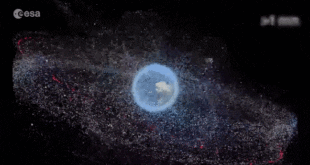
Edinburgh, 13 June 2022. – EU ministers responsible for space adopted conclusions on the ‘Copernicus by 2035’ and on the ‘EU approach to space traffic management’ programmes, The EU Council reported. The two sets of conclusions provide political guidance and strengthen the EU’s common position on space traffic management.
Copernicus, the EU’s Earth observation programme relies on Earth observation satellites and non-space data. The information is utilised to help emergency response, global food security, combating climate change, border control and national security.
The Council conclusions on ‘Copernicus by 2035’ set out a vision and political guidance for the programme based on three pillars. The include the Green Deal, digital transition, and security, while taking user needs, environmental challenges and research into consideration.
The conclusions on the ‘EU approach to space traffic management’ will reinforce EU space surveillance and tracking capabilities. The Council’s viewpoint is that sharing capacities, information and best practices among member states can help tackle the congestion in space. This approach will reduce the risk of collisions while keeping space safe and sustainable.





